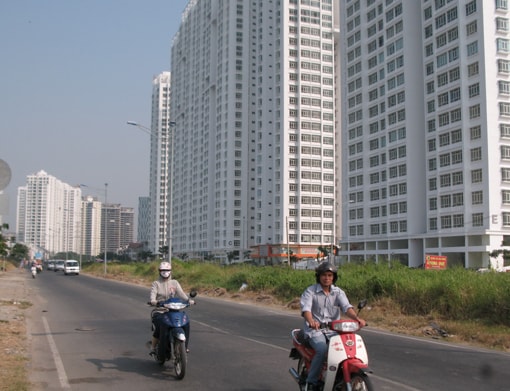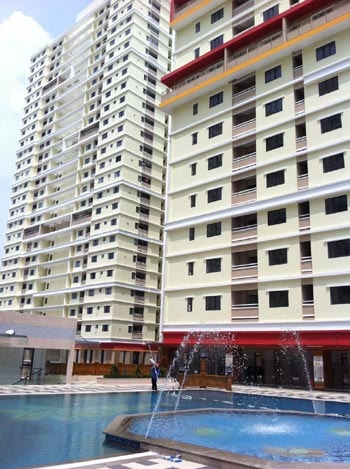Low-income earners still find it difficult to buy a house.
Low-income earners still cannot “reach” houses, although this is considered the time when house prices have “less virtual”. Ho Chi Minh City, with many support policies, has only been able to solve a small part of the housing needs of this group.
Many efforts…
Since 2003, Ho Chi Minh City has issued Directive No. 07/2003/CT-UB stipulating a number of policies on housing for low-income people. A number of regulations on tax policies, capital support, investment procedures, etc. have been issued to support investment projects in building houses for low-income people. The city also stipulates that a number of investment projects must reserve 10% of land fund for housing construction or 20% of housing fund for sale to be put into the land fund serving the housing construction program for low-income people.
 |
| These apartments are still out of reach for low-income earners. |
In the past 10 years, the Ho Chi Minh City Housing Development Fund has disbursed over 600 billion VND to nearly 2,000 low-income people. It has provided loans for a series of housing projects for low-income people such as Ngo Gia Tu resettlement apartments, Nguyen Kim, 109 Nguyen Bieu, 481 Ben Ba Dinh, 241/1/25C Nguyen Van Luong resettlement apartments, An Suong social housing... with a total disbursed capital of nearly 330 billion VND. In 2013, the Fund disbursed 164 billion VND and it is estimated that in 2014 it will disburse about 172 billion VND. However, these investments are still very small compared to the actual needs, because according to calculations by the Ho Chi Minh City Institute for Research and Development, the city currently has over 100,000 low-income people in need of housing.
Ms. Dao Thi Huong Lan, Director of the Ho Chi Minh City Department of Finance, Chairwoman of the Management Board of the Ho Chi Minh City Housing Development Fund, said: The demand for housing for low-income people is very large, but the supply has not developed accordingly. The city is setting a target of building an average of 675,000 square meters of housing floor space each year and by 2015, 17,500 apartments must be built, equivalent to about 1.3 million square meters of floor space to serve low-income people who need housing to buy or rent.
In addition, the City also plans to build about 800,000 square meters of new housing for workers, enough to accommodate about 93,000 workers. “To create conditions for low-income people to access more loans to build housing, we are also proposing to increase the loan amount and continue to lower the loan interest rate to create conditions for the poor to access this source of capital,” said Ms. Lan.
Still many shortcomings
The frozen real estate market, along with many preferential policies for social housing construction, has caused many businesses to convert commercial housing projects into social housing and invest capital in this segment. However, after a short time of "rushing" into social housing projects, businesses have also "fled" or requested to convert social housing projects back to commercial housing projects.
 |
At the time of the Government's Resolution 02/NQ-CP, along with the preferential credit package focusing on the low-cost housing segment, social housing became the focus of investors' attention. Subsequent regulations of the Government such as allowing the splitting and conversion of commercial housing projects into social housing... have created positive signals for this segment. However, up to now, many experts believe that the supply of social housing that meets actual needs is still not available, while the confirmation procedures to buy houses in social housing projects are complicated, causing the social housing segment to almost fall into a deadlock.
On August 21, 2014, the Government issued Resolution 61/NQ-CP allowing buyers to borrow a credit package of 30,000 billion, with the condition that the value of the house does not exceed 1.05 billion VND, and the loan period is extended from 10 to 15 years. The extension of these conditions has helped commercial housing projects to access the 30,000 billion VND package. Many investors who previously tried to convert commercial housing projects into social housing projects have now quickly requested to convert them back into commercial housing projects, because social housing projects are no longer really advantageous, while the procedures are cumbersome.
When the social housing segment is no longer attractive to investors, low-income people can only rely on preferential policies from social housing projects of the State. However, even the State projects, built on public land with many incentives for poor civil servants, are still out of reach for the truly poor, and most of these apartments fall into the hands of people with money, but no need for housing.
Just through brokers or some classifieds pages, we can see that a series of apartments of the city's social housing projects are being advertised for sale or for rent publicly. Although, according to the regulations of the City People's Committee, tenants and renters of social housing are not allowed to arbitrarily sell or transfer the right to rent to others without the written consent of the Department of Construction, in case of violation, their right to rent will be revoked. To Hien Thanh apartment building is an example. This project was built on public land, capital from Saigon Real Estate Corporation and put into use since the beginning of August 2013. The subjects who are allowed to buy and rent houses of this project are officials and civil servants of the city who are eligible to rent and buy social housing. However, many people after buying social housing have... left it empty or rented it out for profit. There are quite a few social housing apartments with an area of 55 - 60 m2 being advertised for rent at prices from 6 - 7 million VND/month.
According to Mr. Le Manh Ha, Director of the Department of Housing and Real Estate Market Management (Ministry of Construction): Social housing policy still has many inappropriate regulations. The implementation process is still mechanical, procedures for accessing loans to buy houses are difficult, while the quality of service is not good.
According to news






